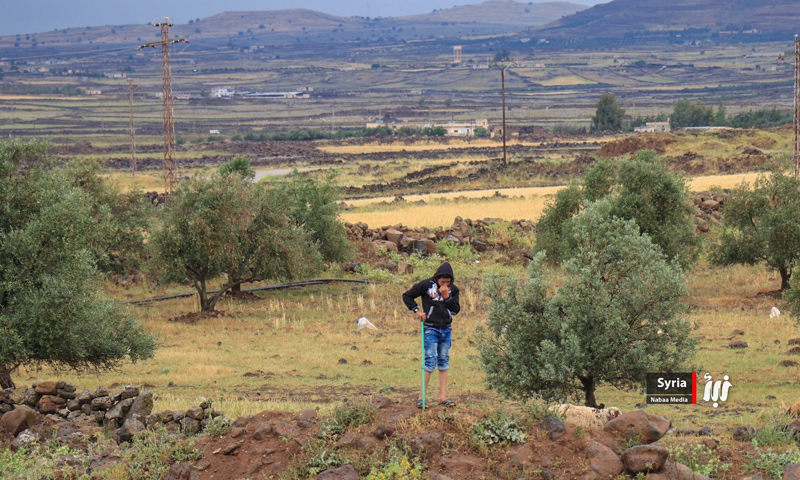Assad’s forces and allied militias have followed the policy of forced displacement in the areas which they managed to recover from the opposition. This policy was not limited to certain areas; rather, it was generalized upon approaching the majority of the Syrian regions, including the southern part, which towns and villages had witnessed the largest waves of displacement.
In the past a few years, the regime gradually regained control over the city of Al-Shaykh Maskin and the towns of Khirbet Ghazaleh, Namer, Ataman and wide areas of the death triangle, from which it displaced the people and prevented them from returning to their homes, inspiring, thus, regional and international fear and imposing a massive pressure on the opposition factions that became aware of the fact that any military loss would possibly mean long years of displacement.
Conditional Return
The town of Ataman, rural Daraa, has been forsaken by its people since Assad’s forces seized it in February 2017. Since then, the people’s several attempts to reach settlement, legalization, agreements that allow them to return to their homes have failed due to Assad’s forces abstinence from opening the town’s file on the pretext that it is located at the confrontation lines with the opposition factions.
Sudden developments befell the scene in the past a few weeks, for Assad’s forces have communicated with a number of the town’s people, who are displaced to Daraa al-Mahatta in the city of Daraa, and suggested that they return to their homes, causing a fuss among the town’s people who were divided into two groups, the first was based in the opposition-held areas and the other in Assad’s forces areas.
“The return to the town requires, first of all, a visit to the al-Baath Party’s Office in the city of Daraa and applying for a permission, attached to the identification document and the family’s identification papers, along with the house’ location,” according to the information given by one of the town’s people, who refused to reveal his name, to Enab Baladi.
He said that the required procedures will help Assad’s forces security agencies “conduct a study about the applicants and their families, where the family members are located, and if any of their relatives is an opposition faction member.”
The applicants have to wait for a week or two, the duration of the “study,” until they could visit the al-Baath Party Office to get the permission if it was issued.
Getting the permission to return to Ataman does not mean that the town’s doors have been opened, for the applicants have to sign “obliging undertakings” that, according to the source, include abstinence from contacting armed groups and cooperating with Assad’s force by reporting these groups and showing commitment to laws and instructions.
In the undertakings, there are articles that address the people required for mandatory and reserve services which they must not evade. Following this, the applicants receive the papers that carry their names, allowing them to return to Ataman town.
The Town Lacks Features
One of the town’s people described what he saw upon going back to the area; he told Enab Baladi that “It was not like the place we left; but it was exactly as we expected it to be, for the scenes of destruction which befell the town were predicted, and the houses that escaped destruction where entirely robbed.”
“You can imagine a house before furnishing; all the furniture was stolen. The bathroom and kitchen cabinets were also stolen. Even the water and electricity extensions did not survive the theft. In short, the intact houses need restoration and furnishing from scratch.”
This situation left the returnees with two choices, either to restore the houses or to leave them the way they are and go back to the places where they have been displaced to, the areas where they have lived for the past a few years.
The current estimates show that about 40 families from the town of Ataman managed to enter the town to check on their houses, which is a weak number if compared to the original number of the town’s families that is over 1500 families.
Most of the families chose to delay the restoration process, which the source linked to the idea that people are waiting for the situation to clarify and to make sure that their houses would not be liable to destruction or robbery once more. Most importantly, they are waiting for more families to return, for with this number only, the town feels “dissolute and scary.”
The reactivation of the Ataman file might be a source of hope for the people in the city of Al-Shaykh Maskin and the towns of Khirbet Ghazaleh and Namer, as well as the death triangle areas that promises a near return to their homes. However, with Assad’s forces and Russia’s media statements which threaten the southern area with a new invasion, the people in Daraa governorate are preoccupied with preventing the displacement of people from other towns, more than helping the people return to the already displaced towns. This situation triggers a number of questions about the time which Assad’s forces have chosen to open the Ataman file, a step behind which a malicious intention might be hiding.

